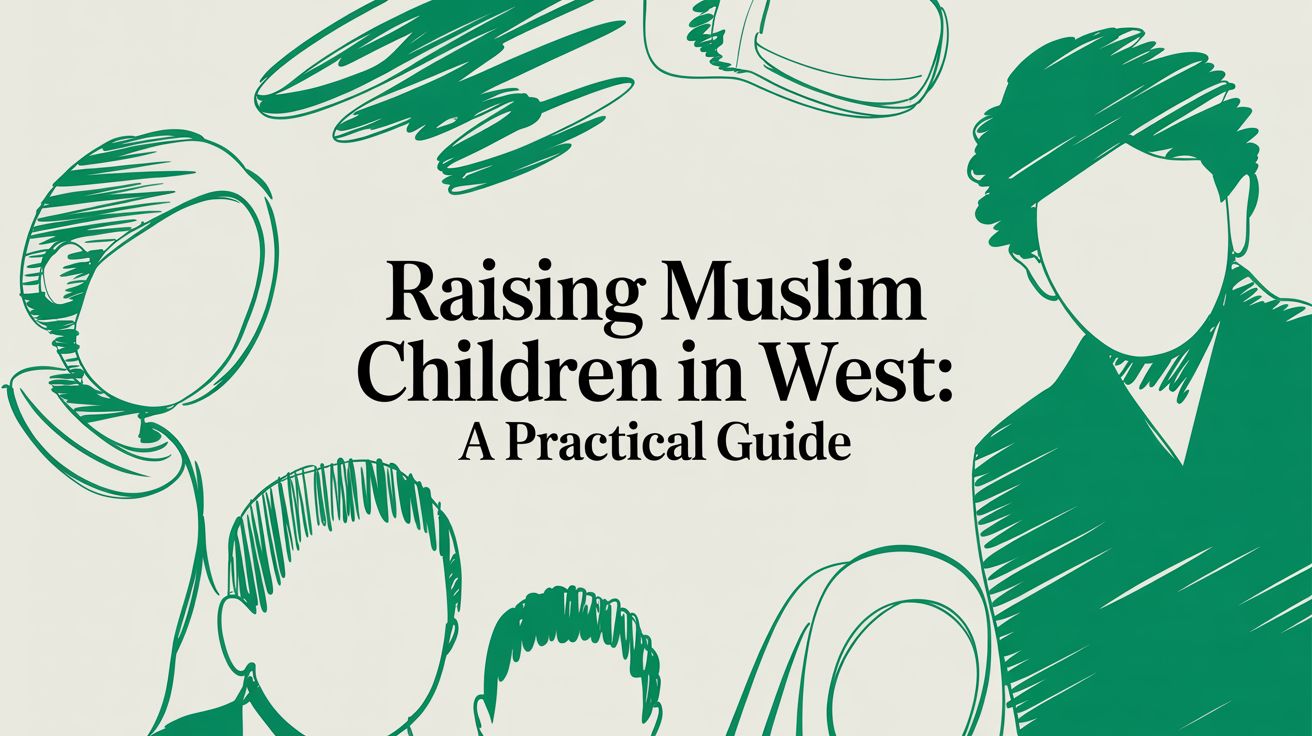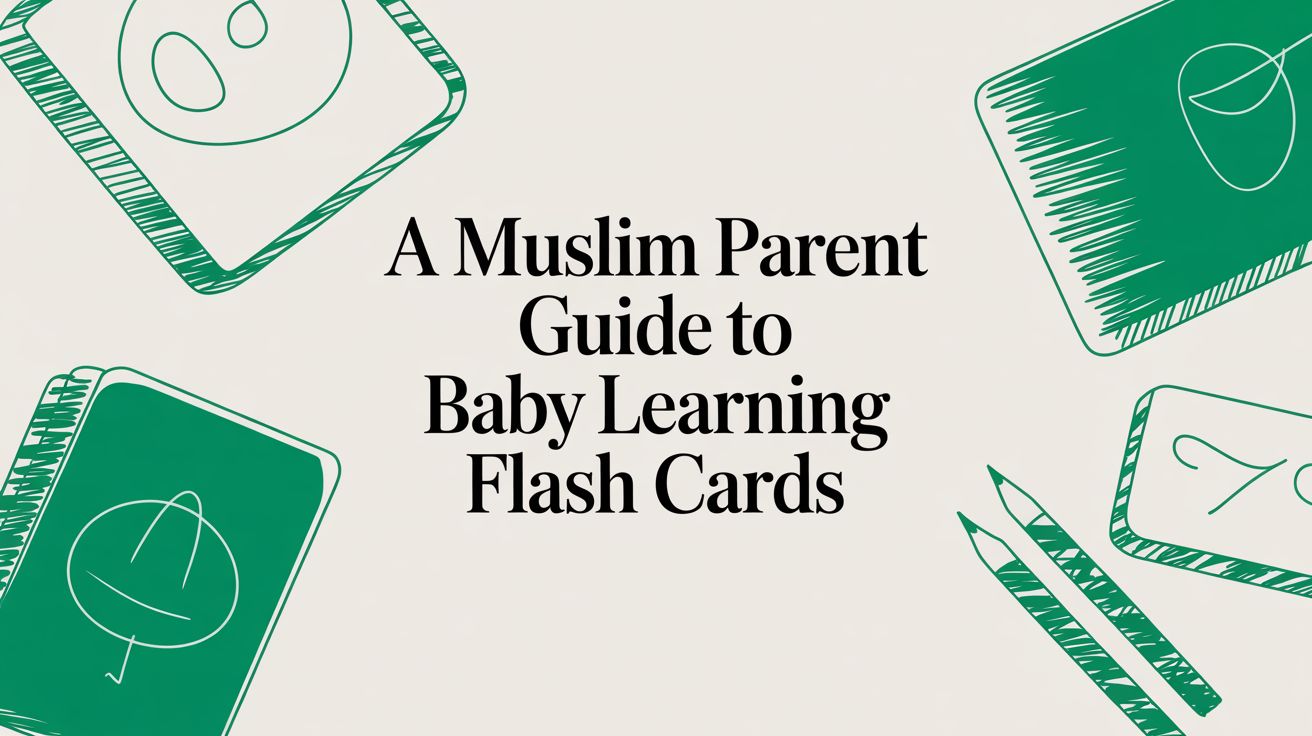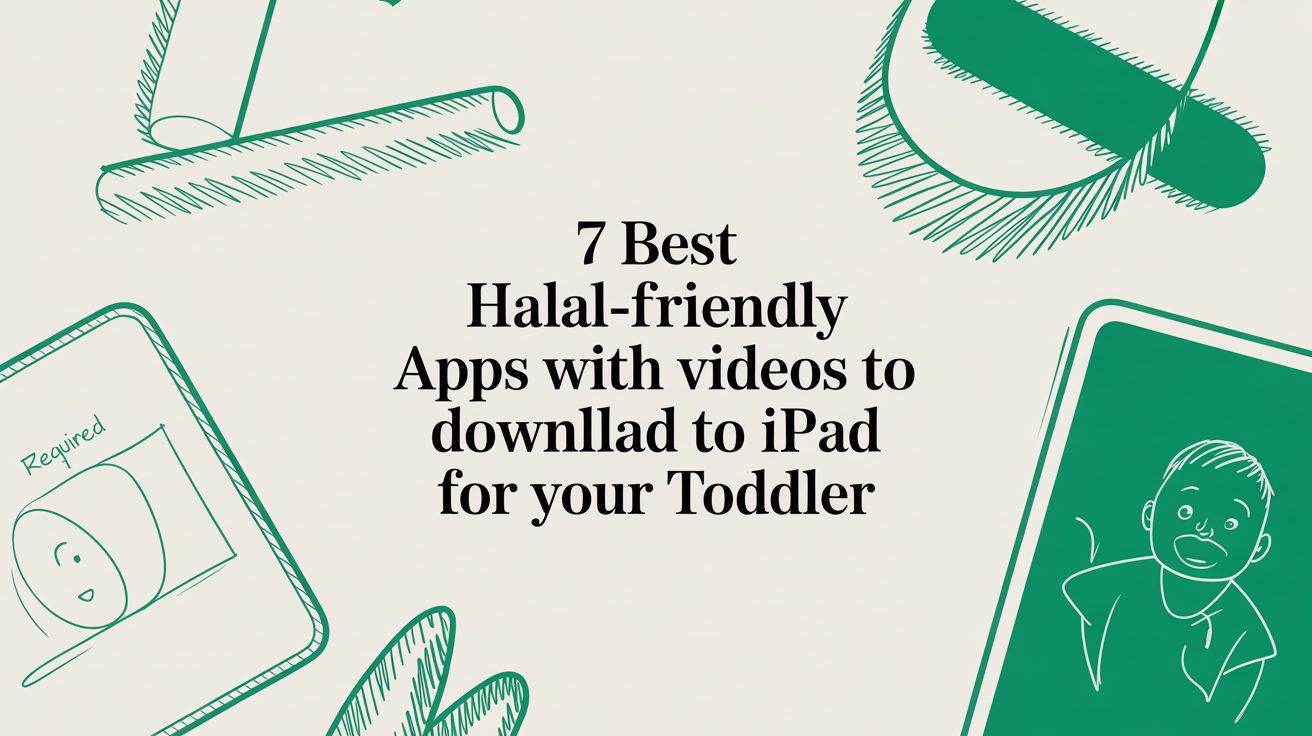Raising a Muslim child in the West is about nurturing their pure, innate nature—their fitra—from their very first breath. It’s a journey of weaving faith into the everyday fabric of life, creating a foundation of love and connection to Islam that feels as natural as breathing.
Laying a Gentle Foundation for Your Muslim Child

Welcome, dear parent. You're starting a special journey, balancing the pace of modern life with a deep hope to raise a confident Muslim child. This guide is for you—the parent of a baby or toddler—navigating those small, real moments that make up your day.
We get it. The quiet challenges are very real. It's trying to manage nap times around prayer schedules. It's searching for board books and toys that reflect your family’s values. It’s about creating a peaceful home where faith is a source of comfort, not pressure. It's those little moments that count the most.
Nurturing Faith from the Start
For our little ones aged 0–3, faith isn't learned through formal lessons. It's absorbed through the atmosphere you create in your home. Their first understanding of Islam will be shaped by the warmth, love, and consistency they feel every day.
The focus in these early years is all about positive association and sensory learning. Think of it as gently planting seeds of love for Allah and His Messenger ﷺ in their hearts through your daily routines.
Your home is your child's first and most important sanctuary. The goal isn't to create a perfect Islamic scholar overnight, but to cultivate a loving environment where their natural connection to faith can blossom.
What This Guide Offers
This isn't about adding more to your already overflowing plate. Instead, we'll explore simple, practical ways to integrate Islamic principles into the routines you already have. Our aim is to give you reassuring advice that feels like a chat with a trusted friend who's been there.
We’ll cover the essentials for raising Muslim children in the West, focusing on the 0-3 age group:
- Daily Routines: How to weave faith into mealtimes, play, and bedtime.
- Home Environment: Tips for creating a space that is both stimulating for development and spiritually grounding.
- Community and Social Life: Navigating playdates, nurseries, and cultural norms with confidence.
Together, let's explore how to build a loving connection to Islam, nurturing a strong, positive identity right from the very first lullaby.
Weaving Faith into Your Daily Routines
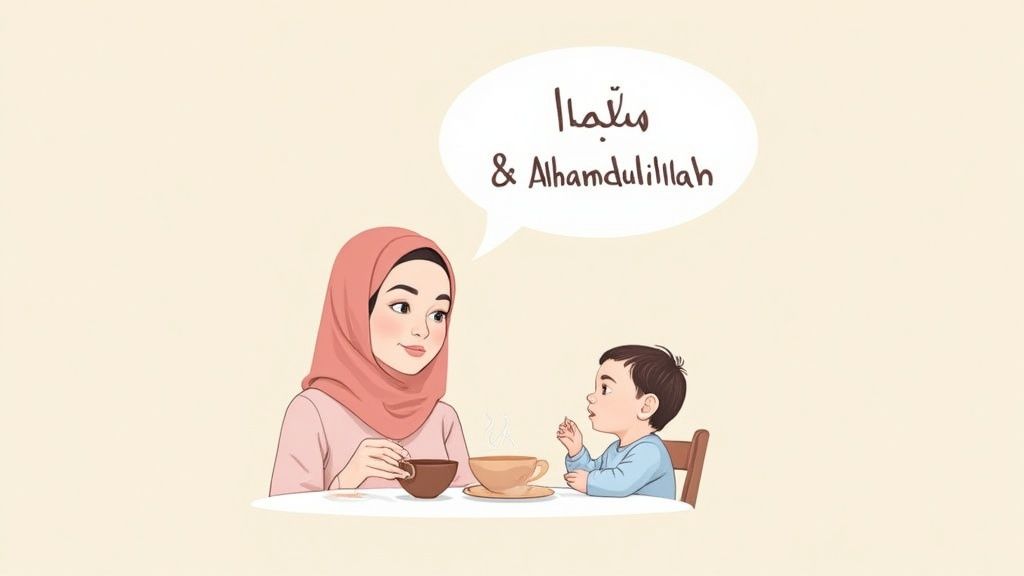
For our little ones, the world makes sense through routine. That predictable rhythm of their day is our greatest tool in raising Muslim children in the West with a deep, effortless connection to their faith. This isn't about formal lessons; it's about creating a home where Islam is the gentle, comforting background music to their day.
The magic happens when you weave faith into the small moments you already share. When done with love and consistency, Islam becomes a source of warmth and security, etched into their earliest, happiest memories.
Morning Moments and Mealtimes
From the moment their eyes flutter open, the day is full of opportunities to introduce the presence of Allah into your child's world. These tiny, repeated acts build a foundation of comfort and love.
- A Gentle Wake-Up: As your baby starts to stir, lean in with a soft "As-salamu alaykum" and a warm smile. They will associate waking up with peace and your loving face.
- 'Bismillah' Before Milk: Before every feed, whether from a bottle or breast, make a habit of whispering "Bismillah." Your baby will begin to connect this beautiful word with feeling full, nurtured, and close to you.
- Gratitude After Food: Once they've had their fill, a gentle "Alhamdulillah" teaches them the feeling of contentment from day one.
These gestures don't add time to your schedule—they just add a layer of spiritual awareness to things you’re already doing.
Playtime and Daily Activities
Even the most chaotic parts of the day—building blocks, messy play, tidying up—can be filled with barakah (blessing). The goal is to make Islamic phrases a natural part of your family's everyday language.
When your toddler finally stacks a wobbly tower of blocks, an excited "Masha'Allah!" connects their small win with a bigger blessing. When they hand you a toy, a simple "Shukran" models beautiful manners. It’s that simple.
Never underestimate the power of your own voice. Softly reciting a short surah, like Surah Al-Ikhlas, during a diaper change can be a wonderfully calming distraction. It associates the sounds of the Qur'an with your gentle care and comfort.
As you go about your day, these little linguistic seeds will grow into a familiar part of their world. At this age, consistency is so much more impactful than intensity.
Winding Down for Bedtime
The transition to sleep is a sacred time. A calming, Islamic bedtime routine can help your child feel profoundly secure and loved as they drift off, ending the day on a peaceful, faith-filled note.
A simple, repeatable routine might look something like this:
* A warm, soothing bath to signal that bedtime is approaching.
* Cuddle up with a gentle board book, perhaps one with Islamic themes or diverse characters.
* While rocking or cuddling, softly recite "SubhanAllah," "Alhamdulillah," and "Allahu Akbar." Let them feel the vibration of the words and the peace in your voice.
* As you lay them down, whisper a simple dua for sleeping into their ear.
This predictable sequence signals to their body and soul that it's time to rest, associating sleep with tranquility and closeness to both you and Allah. For more ideas on structuring these moments, check out our guide to building a balanced Muslim toddler routine.
By embedding these simple, heartfelt practices into your daily life, you’re doing more than just teaching your child about Islam. You’re showing them that faith is a living, breathing source of love and comfort.
Creating a Nurturing Islamic Home Environment

Your home is your child’s first masjid, their first classroom, and their safest sanctuary. For those of us raising Muslim children in the West, being intentional about our home environment is one of the most powerful things we can do. It's about creating a space where a Muslim identity can flourish, surrounded by sights and sounds that make faith feel like coming home.
This isn’t about creating a perfect, museum-like space. It's about weaving faith into daily life so it feels natural and joyful for your little one. When a child feels a deep sense of belonging as a Muslim within their own four walls, they build a quiet confidence they can carry with them anywhere.
Designing a Faith-Aligned Play Space
Think about the corner of your living room where your toddler spends most of their time. The books they flip through and the toys they grasp are the first tools shaping their view of the world.
A few thoughtful choices can make a world of difference:
- Fill Your Bookshelves with Mirrors: Look for board books that show Muslim families of all backgrounds—South Asian, Arab, Black, and converts. When our kids see characters who look like them and their families, it sends a powerful message: "You belong."
- Choose Creative, Open-Ended Toys: Simple wooden blocks, puzzles, and chunky crayons are fantastic. They spark imagination without the overstimulation of many battery-operated toys, allowing for calm, simple play.
- Add Subtle Islamic Art: A beautiful piece of calligraphy with "Bismillah" or a colourful, modern print of the Kaaba can make their room feel special. It integrates Islamic identity into their space in a way that’s beautiful, not overbearing.
The goal is to make Islamic elements a normal, beautiful part of everyday life.
The impact of Muslim families is becoming more visible across Western societies. As of 2016, there were an estimated 26 million Muslims in Europe, a figure projected to approach 36 million by 2050. This growth is partly due to a younger demographic; for instance, the average age of Muslims in Germany is 31, compared to 47 for non-Muslims, reflecting more families in their childbearing years. Learn more about the demographic shifts in Europe's growing Muslim population.
Managing Screen Time with Intention
Let’s be honest. Sometimes you just need ten minutes. Maybe you're trying to pray Maghrib without a toddler climbing on your back, or you need to get dinner on the table. In those moments, screen time can feel like a lifesaver, but the content is what really counts.
So much mainstream kids' content is filled with messages that don't align with our values. The trick is to be proactive, not reactive.
This means finding halal, age-appropriate content before you're in a pinch. Look for platforms and shows that offer:
- Value-Aligned Stories: Content that gently teaches good manners (adab), kindness, sharing, and thankfulness.
- Clean and Wholesome Content: Shows free from inappropriate themes or characters that model behaviour contrary to Islamic teachings.
- An Educational Spin: Videos that introduce the Arabic alphabet, simple duas, or stories about Allah’s creations in a fun, toddler-friendly way.
Having a go-to playlist of safe shows or a subscription to a trusted halal platform can give you immense peace of mind. It turns a moment of need into a positive, faith-building opportunity.
Building Your Child's First Islamic Library (Ages 0-3)
Reading to our little ones is one of the best ways to connect with them and introduce the beauty of Islam. This table is a simple guide to help you build a library that grows with them.
| Book Type | Key Features | Example Topics |
|---|---|---|
| Sensory Board Books | Durable pages, bright colours, and different textures. | "Allah Made the Rainbow," "My First Book of Arabic Letters" |
| Sound Books | Interactive buttons with simple words or sounds. | Books that say "Bismillah," "Alhamdulillah," or make animal sounds. |
| Lift-the-Flap Books | Engaging and interactive, perfect for curious toddlers. | "Where is the Prayer Mat?," "What's Behind the Mosque Door?" |
| Stories of Prophets | Very simplified, age-appropriate introductions. | A board book about Prophet Nuh's (AS) ark or the story of the elephant. |
By curating a thoughtful collection of books, you're not just teaching them to read; you're giving them the building blocks of their identity. Each story weaves another thread into the rich tapestry of their faith.
Navigating Social Settings and Cultural Norms
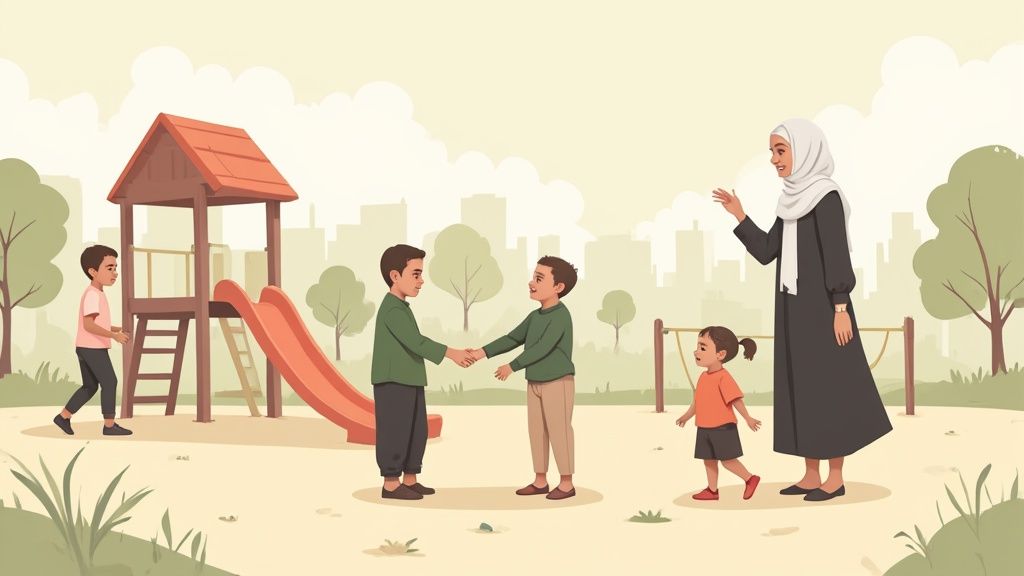
As your little one grows into a curious toddler, their world gets bigger. You're now navigating library story times, park playdates, and birthday party invitations. For those of us raising Muslim children in the West, these social moments can also come with a need for a little extra planning.
How do you politely handle the birthday cake? What's a simple way to answer when another parent asks about your hijab? These are opportunities to live your values with gentle confidence. With a bit of foresight, you can move through these situations with grace, all while protecting your child's innocence.
Handling Food at Parties and Playdates
Food is often one of the first scenarios you'll encounter. Imagine you're at a friend's house for a playdate, and they pull out a plate of gummy sweets. What’s your next move?
The key is to be prepared and positive, never apologetic.
- The Golden Rule: Bring a Halal Alternative. Always pack a small container of your child's favorite halal-friendly snack. When other treats appear, you can smile and say, "Oh, thank you so much! We brought our own special snacks today," as you offer your child their treat.
- Keep Explanations Short and Sweet. At this age, a long discussion isn't necessary. A simple, cheerful, "We have some dietary rules, so we'll stick to this, thanks!" is more than enough for other parents.
- Focus on the Fun, Not the Food. Your toddler isn't going to remember the gummy they didn't eat. They'll remember the fun they had on the slide. Gently redirect their attention back to the joy of playing.
Remember, your confidence sets the tone. When you handle these situations calmly, you model for your child that your family's choices are normal and positive. It builds their resilience from the beginning.
Addressing Questions About Your Faith
As you interact more with other families, you'll likely get questions about your practices, like wearing hijab. These questions usually come from simple curiosity. Having a few warm, simple responses ready can make a world of difference.
If another parent asks about your headscarf, a friendly smile and a straightforward answer work wonders. "It’s a part of my faith that helps me feel connected to God." The goal isn't a deep dive into theology; it's about creating a brief, positive connection. Your warmth is what they'll remember most.
The experience of raising Muslim children in the West has changed over generations. For instance, in 1970s West Germany, first-generation Turkish women had much larger families than native Germans. By 1996, that gap had nearly closed as second-generation families integrated more with European norms. Today, with Muslims making up less than 5% of the population in most Western European countries, fostering mutual understanding is as important as ever. You can learn more from these Muslim demographic trends in Western Europe.
Nurturing Islamic Manners in Social Settings
Playgroups and parks are your toddler’s first classrooms for social skills. This is a beautiful chance to introduce Islamic adab (manners) in a practical way.
- Sharing and Saying 'Shukran'. When you see your toddler share a toy, praise them! "Masha'Allah, that was so kind to share!" When another child shares with them, gently prompt, "What do we say? Shukran!"
- Gentle Hands. Toddlers are still learning how to handle big feelings. If they hit or push, calmly step in. "We use gentle hands with our friends." This reinforces the core Islamic principle of being kind to others.
They're still so little, and they won't get it right every time—and that's okay. Your consistent, gentle reminders are what matter. These early interactions teach them that being a Muslim means being a kind, polite, and good friend to everyone.
For those moments when you need to keep them engaged on the go, our guide on safe, Islamic alternatives to YouTube Kids offers great options that reinforce these positive values.
Finding Your Village and Building Community
Parenting was never meant to be a solo mission. For Muslim families raising kids in the West, finding your 'village' isn't just a nice idea—it's a necessity.
This network becomes your lifeline. It’s where you’ll share advice, celebrate the little wins, and get through tough days with people who truly understand your journey.
That feeling of isolation can hit hard, especially in the early years with a baby or toddler. You might be far from family, or perhaps you're the first in your friend group to have kids. Building community takes intentional effort, but even small steps can forge connections that last a lifetime. It’s about finding other parents who just get it when you mention trying to time a nap around Asr prayer.
Where to Find Your First Connections
Your local mosque or Islamic center is a natural place to start. Many have programs for mothers and young children, but even if yours doesn't, Jummah prayer or community events are perfect for meeting other families.
Don't be shy about striking up a conversation with another mom holding a little one. A simple, "As-salamu alaykum, your baby is so cute, Masha'Allah. How old are they?" can be the beginning of a friendship.
Here are a few places to look for your tribe:
- Mommy-and-Me Halaqas: These informal religious circles are a fantastic mix of spiritual nourishment and social connection.
- Mosque Playgroups: Many larger centers host weekly playgroups where kids can socialize in a safe, familiar environment while the parents chat.
- Community WhatsApp Groups: Ask if there's a local group for Muslim moms. These are gold for asking quick questions or organizing an impromptu park meetup.
If a group for you doesn't exist, think about starting one! It can be as simple as an Islamic story time at the local library or a weekly park gathering. You might be surprised how many other parents are waiting for someone just like you to take the first step.
Looking Beyond the Local Mosque
Your village isn't limited by your postcode. Online communities can be an incredible source of support, especially for new parents or those living in areas with a smaller Muslim population. Facebook groups dedicated to Muslim parenting can offer solidarity and practical advice 24/7.
It's also important to build bridges beyond the Muslim community. Your neighbors and the parents at the library's rhyme time all form part of your wider support network. These relationships build mutual respect and show our children how to be confident, engaged members of a diverse society.
The need for this community is only growing. Studies on fertility patterns show Muslim families are a key part of Europe's next generation. For example, migrant Muslim women in Europe have an average total fertility rate of 2.54 children per woman, which is about 40% higher than national averages. You can explore more of these European demographic findings to see the full picture.
This growing community is our strength. Every connection you make adds another layer of support to your village. It’s this network that makes the journey of raising confident Muslim children in the West feel less daunting and much more joyful.
Nurturing Faith with Love and Patience
Remember, raising Muslim children in the West is a marathon, not a sprint, especially during the foundational years from birth to age three. It’s a journey of the heart, built on small, consistent acts of love.
Every gentle “Bismillah” you whisper before a meal, every prophet story you share at bedtime, and every patient correction you offer is like planting a seed of faith. In these tender years, those quiet, everyday moments have a far greater impact than any formal lesson.
Trust Your Instincts and Allah’s Guidance
The goal isn't perfection; it’s connection. You're building a loving bond between you, your child, and your Creator. You are their first and most important teacher. The warmth, security, and love you give them are the bedrock of their Islamic identity.
Embrace this beautiful responsibility with joy and patience. Trust in your parental instincts and, above all, trust in Allah’s guidance. You are giving your child the most precious gift—a confident, positive identity as a Muslim.
Ultimately, this path is about nurturing their natural disposition, their fitra. It’s about making Islam feel like a warm, comforting home they can always return to. The love you pour into them now is the foundation for everything that follows.
This journey is also strengthened by seeking knowledge for yourself. As you teach them about the blessings of Allah, think about deepening your own connection through supplication. For inspiration, you can explore our guide on the beautiful dua, Allahumma inni as’aluka, which asks for beneficial knowledge, pure provision, and accepted deeds.
You're not just raising a child; you're nurturing the future of our Ummah, one loving day at a time.
Common Questions from Muslim Parents
Raising young Muslim children in the West often brings up specific questions, especially in those early years from birth to three. Here are some gentle, practical answers to common concerns.
How Can I Introduce Prayer to My Toddler?
For toddlers, introducing Salah is about making it feel warm and normal, not about perfection. The most powerful thing you can do is let them see you pray.
Roll out a tiny prayer mat for them next to yours. They'll probably crawl all over you, try to copy you for a second, and then get distracted. That’s perfectly okay—it's part of how they learn.
The goal is to weave prayer into the fabric of your daily life so it becomes a familiar, peaceful rhythm. You can say simple things like, “Mama is talking to Allah now.” At this age, consistent, positive exposure is everything.
What Is an Age-Appropriate Way to Talk About Allah?
With toddlers, keep it simple, loving, and connected to the world they can see and touch. The best way for them to understand Allah is through His creation and His kindness.
When you're outside and see a beautiful flower or the moon, you can say, “Masha’Allah, look what Allah made for us!” If they ask where Allah is, a gentle answer works best: “Allah is always with us, watching over us and keeping us safe.”
Focus on Allah's attributes of love, care, and creation. Deep theological concepts can come much later. Toddler-friendly Islamic books are a fantastic resource for introducing these ideas in a way that feels safe and reassuring.
Your child’s first understanding of Allah will be filtered through your love for them. When they feel your warmth and security, it becomes easier for them to comprehend a Creator who is All-Loving and All-Merciful.
How Do We Celebrate Eid When Family Is Far Away?
This is a big one for many of us. When you can't be with extended family for those huge gatherings, the key is to create your own special traditions, even if they're small. You don't need a crowd to make Eid feel magical.
Here are a few ideas:
* Create an "Eid Corner": A day or two before, hang up balloons, fairy lights, or homemade banners in one part of your home.
* Dress the Part: Put your little one in a special new outfit, even if you’re just celebrating at home. It signals that the day is important.
* Connect from a Distance: Set up video calls with grandparents and cousins. Let them see your baby dressed up and share in the excitement.
* Start a New Tradition: Find one or two other local Muslim families and plan a simple Eid playdate or a picnic in the park.
These small, intentional acts are what build a sense of celebration and belonging that your child will remember as they grow up.
Is It Too Early to Introduce Arabic to My One-Year-Old?
Absolutely not! It is never too early. A child's brain in the first few years is like a sponge for language. Any exposure you give them now builds a strong foundation.
If you can, try the "one parent, one language" approach. If that’s not realistic, don't worry. You can weave Arabic into daily routines—by naming foods at mealtime or counting their fingers and toes. Simple Arabic nursery rhymes and colorful board books with Arabic words are also wonderful.
Consistency is far more important than intensity. Even just a few minutes of playful exposure every day helps the language feel familiar and natural to them, which is a huge gift.
Navigating these early years is a journey of love and learning. For those moments when you need screen time that aligns with your values, Babymode offers a safe, halal, and ad-free digital space for your little one to explore. Our AI-generated, Islamically-guided content nurtures your child's faith from the very beginning. Learn more and join the waitlist at babymode.ai.
